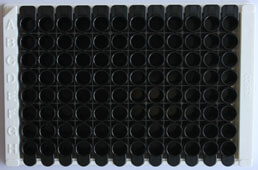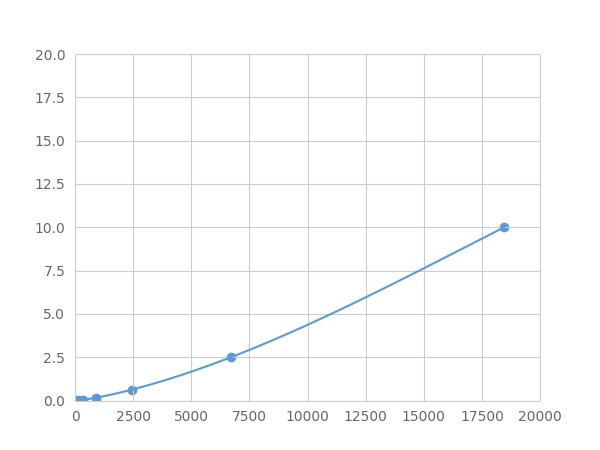Packages (Simulation)

Reagent Preparation

Image (I)
Image (II)
Certificate


Multiplex Assay Kit for Peroxisome Proliferator Activated Receptor Gamma (PPARg) ,etc. by FLIA (Flow Luminescence Immunoassay)
PPAR-G; PPARG1; PPARG2; NR1C3; Glitazone Receptor; Nuclear Receptor Subfamily 1 Group C Member 3
(Note: Up to 8-plex in one testing reaction)
- Product No.LMA886Ra
- Organism SpeciesRattus norvegicus (Rat) Same name, Different species.
- Sample TypeSerum, plasma, tissue homogenates, cell lysates, cell culture supernates and other biological fluids.
- Test MethodDouble-antibody Sandwich
- Assay Length3.5h
- Detection Range0.01-10ng/mL
- SensitivityThe minimum detectable dose of this kit is typically less than 0.003 ng/mL.
- DownloadInstruction Manual
- UOM 8Plex 7Plex 6Plex 5Plex 4Plex 3Plex 2Plex1Plex
- FOB
US$ 427
US$ 443
US$ 468
US$ 501
US$ 534
US$ 583
US$ 657
US$ 821
Add to Price Calculator
Result
For more details, please contact local distributors!
Specificity
This assay has high sensitivity and excellent specificity for detection of Peroxisome Proliferator Activated Receptor Gamma (PPARg) ,etc. by FLIA (Flow Luminescence Immunoassay).
No significant cross-reactivity or interference between Peroxisome Proliferator Activated Receptor Gamma (PPARg) ,etc. by FLIA (Flow Luminescence Immunoassay) and analogues was observed.
Recovery
Matrices listed below were spiked with certain level of recombinant Peroxisome Proliferator Activated Receptor Gamma (PPARg) ,etc. by FLIA (Flow Luminescence Immunoassay) and the recovery rates were calculated by comparing the measured value to the expected amount of Peroxisome Proliferator Activated Receptor Gamma (PPARg) ,etc. by FLIA (Flow Luminescence Immunoassay) in samples.
| Matrix | Recovery range (%) | Average(%) |
| serum(n=5) | 83-94 | 90 |
| EDTA plasma(n=5) | 80-99 | 88 |
| heparin plasma(n=5) | 79-94 | 89 |
| sodium citrate plasma(n=5) | 78-104 | 91 |
Precision
Intra-assay Precision (Precision within an assay): 3 samples with low, middle and high level Peroxisome Proliferator Activated Receptor Gamma (PPARg) ,etc. by FLIA (Flow Luminescence Immunoassay) were tested 20 times on one plate, respectively.
Inter-assay Precision (Precision between assays): 3 samples with low, middle and high level Peroxisome Proliferator Activated Receptor Gamma (PPARg) ,etc. by FLIA (Flow Luminescence Immunoassay) were tested on 3 different plates, 8 replicates in each plate.
CV(%) = SD/meanX100
Intra-Assay: CV<10%
Inter-Assay: CV<12%
Linearity
The linearity of the kit was assayed by testing samples spiked with appropriate concentration of Peroxisome Proliferator Activated Receptor Gamma (PPARg) ,etc. by FLIA (Flow Luminescence Immunoassay) and their serial dilutions. The results were demonstrated by the percentage of calculated concentration to the expected.
| Sample | 1:2 | 1:4 | 1:8 | 1:16 |
| serum(n=5) | 78-92% | 91-105% | 97-104% | 79-91% |
| EDTA plasma(n=5) | 78-101% | 89-96% | 93-101% | 89-96% |
| heparin plasma(n=5) | 79-103% | 91-99% | 83-99% | 88-102% |
| sodium citrate plasma(n=5) | 94-102% | 78-93% | 87-103% | 83-92% |
Stability
The stability of kit is determined by the loss rate of activity. The loss rate of this kit is less than 5% within the expiration date under appropriate storage condition.
To minimize extra influence on the performance, operation procedures and lab conditions, especially room temperature, air humidity, incubator temperature should be strictly controlled. It is also strongly suggested that the whole assay is performed by the same operator from the beginning to the end.
Reagents and materials provided
| Reagents | Quantity | Reagents | Quantity |
| 96-well plate | 1 | Plate sealer for 96 wells | 4 |
| Pre-Mixed Standard | 2 | Standard Diluent | 1×20mL |
| Pre-Mixed Magnetic beads (22#:PPARg) | 1 | Analysis buffer | 1×20mL |
| Pre-Mixed Detection Reagent A | 1×120μL | Assay Diluent A | 1×12mL |
| Detection Reagent B (PE-SA) | 1×120μL | Assay Diluent B | 1×12mL |
| Sheath Fluid | 1×10mL | Wash Buffer (30 × concentrate) | 1×20mL |
| Instruction manual | 1 |
Assay procedure summary
1. Preparation of standards, reagents and samples before the experiment;
2. Add 100μL standard or sample to each well,
add 10μL magnetic beads, and incubate 90min at 37°C on shaker;
3. Remove liquid on magnetic frame, add 100μL prepared Detection Reagent A. Incubate 60min at 37°C on shaker;
4. Wash plate on magnetic frame for three times;
5. Add 100μL prepared Detection Reagent B, and incubate 30 min at 37°C on shaker;
6. Wash plate on magnetic frame for three times;
7. Add 100μL sheath solution, swirl for 2 minutes, read on the machine.
GIVEAWAYS
INCREMENT SERVICES
| Magazine | Citations |
| Neuroscience Letters | Elevated levels of PPAR-gamma in the cerebrospinal fluid of patients with multiple sclerosis Pubmed: 24021801 |
| J Cell Biochem. | Nonivamide enhances miRNA let‐7d expression and decreases adipogenesis PPARγ expression in 3T3‐L1 cells Pubmed:25704235 |
| Osteoarthritis Cartilage | Establishment of a rabbit model to study the influence of advanced glycation end products accumulation on osteoarthritis and the protective effect of pioglitazone PubMed: 26321377 |
| J Clin Diagn Res. | Evaluation of Protein Kinase Cβ and PPARγ Activity in Diabetic Rats Supplemented with Momordica charantia pmc:PMC4866090 |
| Journal of Clinical&Diagnostic Research | Evaluation of Protein Kinase Cβ and PPARγ Activity in Diabetic RatsSupplemented with Momordica charantia. pubmed:27190792 |
| Osteoarthritis and Cartilage | Establishment of a rabbit model to study the influence of advanced glycation end productsaccumulation on osteoarthritis and the protective effect of pioglitazone. pubmed:26321377 |
| Neuroscience Letters | Unlike PPARgamma, neither other PPARs nor PGC-1alpha is elevated in the cerebrospinal fluid of patients with multiple sclerosis pubmed:28483651 |
| European Journal of Immunology | Engulfment of Hb‐activated platelets differentiates monocytes into pro‐inflammatory macrophages in PNH patients Pubmed:29677388 |
| Histochemistry and Cell Biology | Simpson–Golabi–Behmel syndrome human adipocytes reveal a changing phenotype throughout differentiation Pubmed:29574488 |
| molecular and cellular biochemistry | Maternal omega-3 fatty acids and vitamin E improve placental angiogenesis in late-onset but not early-onset preeclampsia Pubmed: 31420792 |
| Nutrients. | Hyperglycemia Changes Expression of Key Adipogenesis Markers (C/EBPα and PPARᵞ) and Morphology of Differentiating Human Visceral Adipocytes Pubmed: 31398873 |
| journal of biochemical and molecular toxicology | Indomethacin and juglone inhibit inflammatory molecules to induce apoptosis in colon cancer cells Pubmed: 31916655 |
| J Cosmet Dermatol | In©\vitro effect of pine bark extract on melanin synthesis, tyrosinase activity, production of endothelin©\1 and PPAR in cultured melanocytes exposed to Ultraviolet?¡ 33960120 |
| American Chemical Society | TRPA1 Agonist Cinnamaldehyde Decreases Adipogenesis in 3T3-L1 Cells More Potently than the Non-agonist Structural Analog Cinnamyl Isobutyrate 33403292 |
| PLoS One | Quantitative real-time measurement of endothelin-1-induced contraction in single non-activated hepatic stellate cells 34343209 |
| Prostaglandins Leukot Essent Fatty Acids | Maternal Vitamin D Deficiency Reduces Docosahexaenoic Acid, Placental Growth Factor and Peroxisome Proliferator Activated Receptor Gamma levels in the Pup … 34768025 |
| Food and Chemical Toxicology | Melatonin attenuates cisplatin-induced acute kidney injury in mice: Involvement of PPARα and fatty acid oxidation Pubmed:35367536 |





